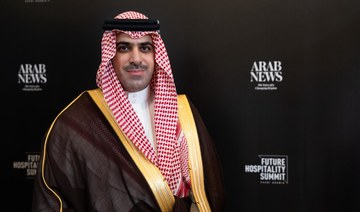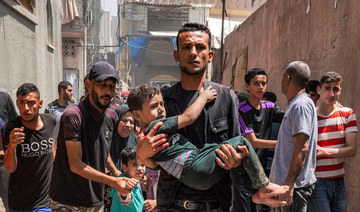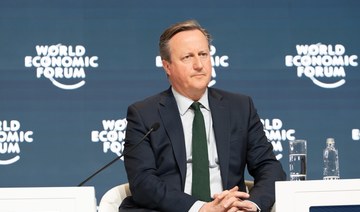Kirkuk - IRQ
Kirkuk, Iraq, May 4, 2018 (AFP) - In the multi-ethnic city of Kirkuk it is hard to find posters of Kurdish candidates for Iraq's upcoming elections, but the campaigns of other hopefuls are in full swing.
The past seven months have seen a dramatic turn of events in Kirkuk, the "Jerusalem of Kurdistan" where hopes of independence for Iraqi Kurdistan were dashed after Baghdad retaliated against a referendum held in September.
The May 12 national elections have been welcomed by the city's Arab and Turkmen politicians, who are busy organising campaign meetings and whose election posters hang proudly in place.
In the Kurdish neighbourhood of Rahim Awa, home to the polling station that received the largest number of votes in the referendum, passers-by prefer not to discuss the return to the polls.
Only Freidoun Rahim, a 41-year-old Kurdish labourer, was willing to express his view.
"I voted yes in the referendum but today we have to live together -- Kurds, Arabs and Turkmen -- and so I will vote on May 12," he told AFP, without indicating which list he supported.
Rahim is one of around 940,000 registered voters in the oil-rich province of Kirkuk, who will decide between 291 candidates -- 80 percent of which are new faces -- divided into 31 lists.
The hopefuls are vying for just 13 seats, one of which is already reserved for a Christian politician.
In the 2014 elections Kurds took eight of the available seats, with the Patriotic Union of Kurdistan (PUK) winning six seats and their rivals the Kurdistan Democratic Party (KDP) securing the other two. Kirkuk's Arab and Turkmen communities each saw two lawmakers voted into parliament.
The outcome of this month's vote remains uncertain, with the KDP -- which initiated the referendum -- calling for a boycott and declaring the province an "occupied territory".
Other Kurdish groups have refused to present a unified list of candidates, while the PUK is urging its supporters to go to the polls.
But the party is facing allegations of betrayal after it facilitated the federal army's takeover of the province six months ago.
Federal troops pushed Kurdish forces out of Kirkuk and its oilfields in October, part of Baghdad's response to the "illegal" referendum that also saw the central government impose economic sanctions.
"My presence in Kirkuk during these difficult times is proof of my loyalty to the city," declares a slogan on the election poster of lawmaker Rebwar Taha Mustafa, head of the PUK list.
Speaking to AFP in his office, Mustafa alluded to the Arab and Turkmen groups: "Today we are witnessing the revenge of certain people."
He said the PUK had no choice but to allow federal troops into Kirkuk in October.
"The referendum changed the equation, but it's very temporary," the 40-year-old politician said, while admitting it is unlikely the PUK will do as well in this year's election.
"Kirkuk is Iraqi, yes, but with a Kurdish identity. The Kurds will still win but not with eight seats as in the last poll."
When Kirkuk residents went out to vote in September, they were met with the green, white and red Kurdish flag, a sun in the centre, flying in the streets.
It has since been replaced by the blue Turkmen flag, adorned with a crescent moon and one star, along with slogans for Arab candidates declaring "Kirkuk belongs to its residents".
"The next elections will show the real weight of different communities," said Turkmen politician Hassan Tauran.
"We warned the Kurds that the cost of the referendum would be very high and those that imagine a return (to the situation before) are dreaming," he told AFP.
His view was echoed by Amer al-Juburi, a candidate from Iraqi Prime Minister Haider al-Abadi's list, who said: "Kirkuk is Iraqi, those who don't like the new situation can go elsewhere."
The political change can be seen in the office of governor Rakan al-Juburi, the Arab replacement of a pro-independence Kurd, who removed a photo of PUK founder Jalal Talabani from the wall.
The image has been replaced by one of Fuad Masum, a Kurd who is also Iraq's sitting president.
ac/sk/sbh/rsc/dco/fa
Dispirited Kurds shy away from Iraqi elections in Kirkuk
Dispirited Kurds shy away from Iraqi elections in Kirkuk
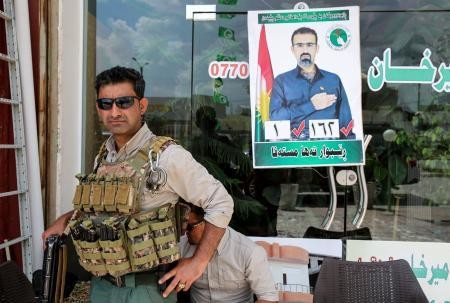
New incubator will promote sustainable mining in Saudi Arabia
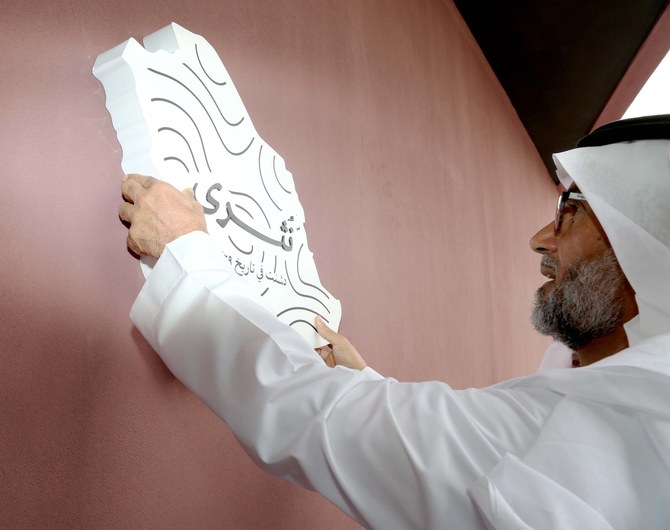
- ‘Nuthree’ aims to boost mining entrepreneurship in the Kingdom
MAKKAH: Nuthree, an exploration incubator initiative for entrepreneurship in geology and mining, has been launched at the Saudi Geological Survey’s headquarters in Jeddah.
The project seeks to create a sustainable exploration environment to develop the Kingdom’s resource sites, positioning mining as its third pillar of income after petroleum and petrochemicals.
Saudi Geological Survey CEO Abdullah Al-Shamrani said the Kingdom was experiencing a new phase of growth and prosperity under King Salman and Crown Prince Mohammed bin Salman, driven by the Saudi Vision 2030 and the National Industrial Development and Logistics Program.
He told Arab News: “We aim for cooperation and integration with our partners in the Ministry of Industry and Mineral Resources and the Small and Medium Enterprises General Authority to serve and empower emerging investors in the mining exploration sector from individuals to local companies, and to establish a local, sustainable exploration environment through the Kingdom’s resources sites, making it an entry point for promising industries.”
He added Nuthree enhanced geological knowledge due to the variety of metals in the Kingdom and would serve as an incubator for small-scale investors and explorers.
“We support the localization of exploration for Saudi companies and foreign firms operating in Saudi Arabia because of its strategic importance,” Al-Shamrani said.
The Saudi Geological Survey is gathering information quickly to attract investors. This includes a comprehensive survey of the Kingdom’s sedimentary cover and the Arabian Shield.
Al-Shamrani said the incubator’s primary goal was to support and localize exploration in the Kingdom, helping investors engage in the process in a professional and practical way. It supplies information across various geological fields and the range of metals it is planned to explore is extensive.
“We expect investors to form complementary partnerships and alliances to achieve the best outcomes. This is a significant step that we support,” he said. “We will not only offer information but also support drilling, coordination and advisory visits to key locations.”
Abdulrahman Al-Balushi, undersecretary of the Ministry of Industry and Mineral Resources, told Arab News that exploration was the start of the mining process which was why it was so important.
He said the Kingdom was focused on supporting small and medium-sized enterprises through partnerships with the private and public sectors, as well as academic institutions, to help them obtain licenses and uncover new mining opportunities.
Al-Balushi said: “The ministry granted 500 licenses to private sector companies, allowing them to explore ores in base metals and precious metals.” Some of these companies were Saudi-based, he added, while others were either joint ventures or foreign-owned but registered with the Saudi Ministry of Commerce.
The exploration process receives particular support if “it targets locations with ores that are very important for the Kingdom’s industry, such as nickel, lithium, zinc, and copper, or certain materials that are part of simple and transformative industries and have a significant impact on the Kingdom’s economy,” he said.
Al-Balushi said the Nuthree incubator aimed to support small and medium-sized enterprises in the Kingdom by providing expertise in geology and mining. It offers technical courses, organizes trips to mining sites, and facilitates knowledge sharing with geological experts.
Occupiers using ‘fake news’ against freedom struggles in Kashmir, Palestine — Pakistan’s UN envoy
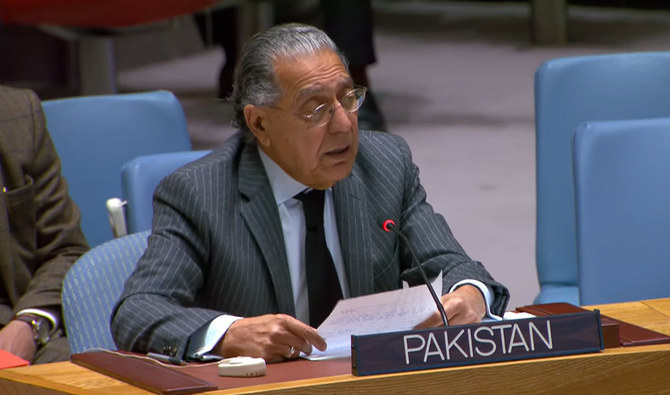
- Conflicts in Gaza and Ukraine have become key battlegrounds in an information war
- Online propaganda fighting to make people around the world take sides, harden positions
ISLAMABAD: Pakistan’s Permanent Representative to the United Nations, Ambassador Munir Akram, has said occupying powers were increasingly using fake news and disinformation campaigns to subdue freedom struggles in Kashmir and Palestine, state-run APP said on Tuesday.
The conflicts in Gaza and Ukraine have become key battlegrounds in an information war that goes far wider than their tightly drawn physical borders. Carefully crafted social media posts and other online propaganda are fighting to make people around the world take sides, harden their positions and even move broader public opinion.
While plenty of real imagery and accounts of the ensuing carnage have emerged, they have been intermingled with users pushing false claims and misrepresenting videos from other events.
“We are witnessing this today in the Gaza war and have witnessed this consistently in the case of occupied Jammu and Kashmir,” Akram told the UN Committee on Information on Monday, referring to online disinformation campaigns.
Akram voiced regret that the use of digital media was “turbocharging” the spread of disinformation “to promote Islamophobia to justify foreign occupation and aggression to turn victims of aggression into the culprits.”
This had led Pakistan to initiate a resolution on disinformation which was unanimously adopted last year, the Pakistani envoy said, adding that consultations would soon take place to advance its objectives.
“Pakistan would welcome the development of an inter-governmentally formulated code of conduct for information integrity on digital platforms,” Akram said, adding that the increasing use of AI tools to spread false information and conduct digital surveillance needed to be addressed.
“At the core of information manipulation, Internet blackouts, censorship and the use of special media laws by the occupation authorities is a sinister design to de-legitimize freedom struggles and perpetuate a climate of fear, intimidation and violence,” Akram added.
In some instances with regards to the Gaza war, online propaganda simply involves the framing of real events, violent images and videos, and hate speech to emphasize the guilt of one side and vindicate the other.
But much of the material relies on the creation of what’s commonly referred to as fake news, in the form of fabricated stories published on social media that repurpose or mislabel real photos or videos.
For example, one post on X (formerly Twitter) that was viewed 300,000 times used a photo of an accidental fire at a McDonald’s restaurant in New Zealand to falsely claim the company had been attacked by pro-Palestinian protesters for its perceived support of Israel. Despite being debunked, the story was still the focus of heated discussions on social media channels.
There are also reports of excerpts from video games and old TikToks being shared with claims they are from real current events in Gaza, and fake government agency social media accounts posting disinformation.
Pakistan unveils advanced anti-rape cell in Karachi to boost conviction rate in sexual violence cases
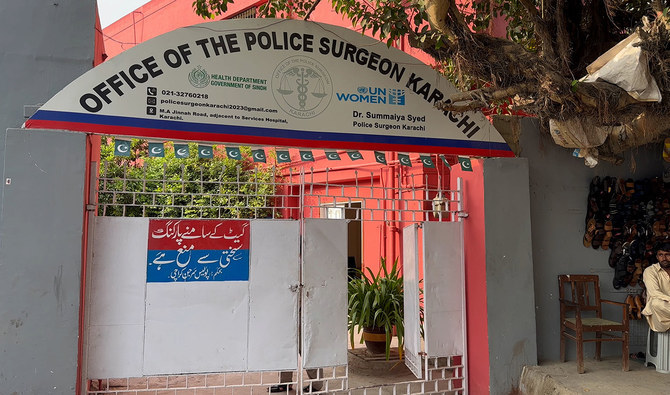
- The model cell is an improved version of a pilot project launched in the southern Pakistani city last year
- A medical legal department at the center of the new cell will work with the police, empower prosecution
KARACHI: Less than eight months after the inauguration of the pioneering Anti-Rape Crisis Cell in Pakistan’s southern Sindh province, authorities on Tuesday unveiled a model cell to address legal cases involving sexual- and gender-based violence.
According to War Against Rape, a non-profit organization, Pakistan witnessed 5,279 reported rape cases in 2021, with less than three percent resulting in convictions, highlighting the urgent need for such initiatives.
Dr. Summaiya Syed, Police Surgeon Karachi, said recent measures in the province, including the Sindh Sexual Violence Response Framework of 2021 and the launch of the pilot Anti-Rape Crisis Cell last year, had shown promising progress, taking the conviction rate in cases of sexual violence from five to 15 percent.
“It offers separate spaces which weren’t really available in the pilot project,” she said after the launch of the model cell at the Jinnah Postgraduate Medical Hospital in a ceremony attended by the provincial health minister, Dr. Azra Pehechu, as the chief guest.
“Now we have better a space, better organization, better referral pathways, better connections between those referral pathways and better availability of resources,” she added.
Dr. Syed said they had learned several things from the pilot project which were utilized while setting up the new establishment.
“We hope that here since now we have dedicated referral pathways, dedicated SOPs [standard operating procedures] will be followed,” she added. “I have better staff provisions over here. We hope to take that [conviction ratio] higher.”
Maliha Zia, Associate Director Legal Aid Society, said facilities like anti-rape cells generate proper and effective evidence in cases of rape which can be used during the prosecution stage.
She said the government of Sindh, along with the police and the judiciary, had been working extensively for the last three years on improving the state’s response to rape cases.
The initiatives taken by the provincial authorities, she added, included training of medical staff to understand the role that they need to play during the trial and the necessary changes they need to make while reporting these cases.
“All this work has culminated in the establishment of an anti-rape crisis cell which not only puts together the medical legal department at the center, a capacitated medical legal department, but connects it directly with the police and prosecution to make an effective case,” Zia continued, adding strong medical evidence and solitary statement of the survivor would result in conviction rates.
Israel police say Turk shot dead after stabbing officer in Jerusalem
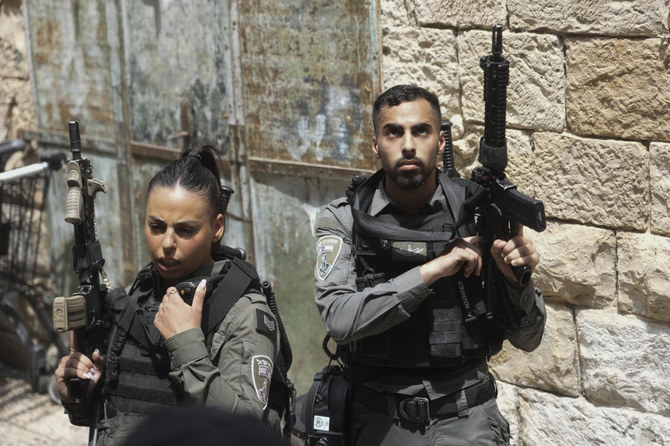
JERUSALEM: A Turkish national stabbed and moderately wounded an Israeli police officer in annexed east Jerusalem before being shot dead on Tuesday, police said.
Police said that a “terrorist armed with a knife arrived in the Old City of Jerusalem, on the Herod’s Gate Ascent street, charged at a border police officer and stabbed him with a knife.”
It said another officer at the scene “neutralized the terrorist” and the attacker was later pronounced dead.
Netanyahu vows to invade Rafah ‘with or without a deal’ as ceasefire talks with Hamas continue
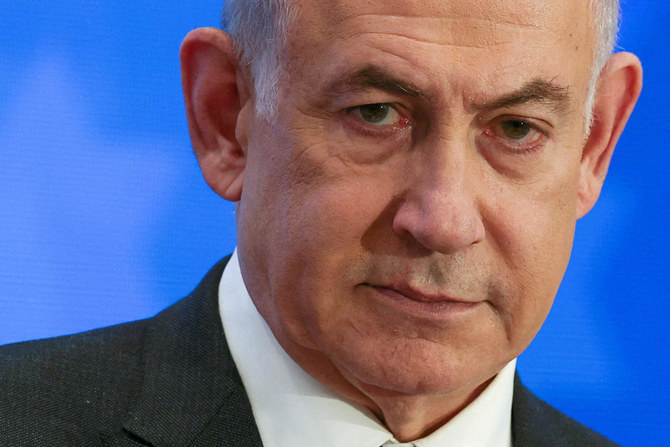
- Netanyahu said Israel would enter Rafah to destroy Hamas’ battalions there “with or without a deal”
- The international community have raised an alarm over the the fate of civilians in Rafah
TEL AVIV: Israeli Prime Minister Benjamin Netanyahu pledged Tuesday to launch an incursion into the southern Gaza city of Rafah, where hundreds of thousands of Palestinians are sheltering from the almost 7-month-long war, as ceasefire negotiations between Israel and Hamas appear to be gaining steam.
Netanyahu’s comments came hours before US Secretary of State Antony Blinken arrives in Israel to advance the truce talks — which appear to be one of the most serious rounds of negotiations between Israel and Hamas since the war began. The deal is meant to free hostages, bring some relief to the population and avert an Israeli offensive into Rafah and the potential harm to civilians there.
Speaking to a group of bereaved families and one organization representing families of hostages held by militants, Netanyahu said Israel would enter Rafah to destroy Hamas’ battalions there regardless of whether a truce-for-hostages deal was struck or not.
“The idea that we will stop the war before achieving all of its goals is out of the question,” Netanyahu said, according to a statement from his office. “We will enter Rafah and we will eliminate Hamas’ battalions there — with or without a deal, to achieve the total victory.”
Netanyahu has faced pressure from his nationalist governing partners not to proceed with a deal that might prevent Israel from invading Rafah, which it says is Hamas’ last major stronghold. His government could be threatened if he agrees to a deal because hard-line Cabinet members have demanded an attack on Rafah.
But with more than half of Gaza’s 2.3 million people sheltering there, the international community, including Israel’ top ally the US, has warned Israel against any offensive that puts civilians at risk.
It was not clear if Netanyahu’s comments were meant to appease his governing partners or whether they would have any bearing on any emerging deal with Hamas.
Netanyahu was addressing the Tikva Forum, a small group of families of hostages that’s distinct from the main group representing the families of captive Israelis that has indicated it prefers to see Hamas crushed over the freedom of their loved ones. Families and their supporters have demonstrated in the thousands every week for a deal that would bring the hostages home, saying it should take precedence over military action.
The current deal being discussed, brokered by the US, Egypt and Qatar, would see the release of dozens of hostages in exchange for a six-week halt in fighting as part of an initial phase, according to an Egyptian official and Israeli media. Hundreds of Palestinian prisoners held by Israel would also be released.
But a sticking point remains over what happens next. Hamas has demanded assurances that an eventual release of all hostages will bring a complete end to Israel’s nearly seven-month assault in Gaza and a withdrawal of its troops from the devastated territory. Israel has offered only an extended pause, vowing to resume its offensive once the first phase of the deal is over. The issue has repeatedly obstructed efforts by the mediators during months of talks.
Netanyahu has repeatedly rejected stopping the war in return for hostage releases, and says an offensive on Rafah is crucial to destroying the militants.
The Israel-Hamas war was sparked by the unprecedented Oct. 7 raid into southern Israel in which militants killed around 1,200 people, mostly civilians, and abducted around 250 hostages. Israel says the militants are still holding around 100 hostages and the remains of more than 30 others.
The war in Gaza has killed more than 34,000 Palestinians, according to local health officials. The war has driven around 80 percent of Gaza’s population of 2.3 million from their homes, caused vast destruction in several towns and cities, and pushed northern Gaza to the brink of famine.



